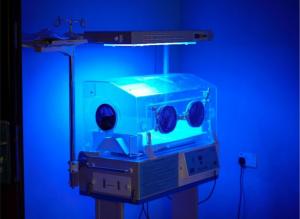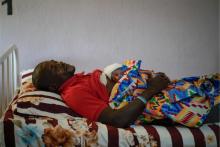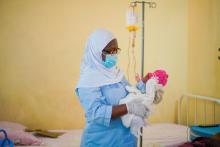World Prematurity Day - Saving every baby born too early
Abuja 17 November 2021 - In November 2019, Ijeoma Uchenna, 25 years old, was rushed to the hospital because she had a premature rupture of the membranes and mild contractions.
The baby was born at 33 weeks of pregnancy through an emergency Cesarean Section at a private hospital in Kubwa, Abuja.
Born prematurely, the baby required specialized care at the neonatal intensive care unit(NICU). A baby is premature if they are born before 37 weeks. Since the hospital had no such facility, they referred the baby to a government tertiary health institution, separating him from his mother. The baby travelled 34.6 kilometers before admitted in the NICU at a tertiary hospital in Abuja.
“Fortunately, there was a vacant incubator at the tertiary hospital. He was in the hospital for about four weeks before we brought him home”, said Ijeoma's husband, Mr Uchenna.
In Kwali General Hospital, Jeremiah Bulus anxiously waits for his daughter to be attended to by a nurse. He and his wife are using Kangaroo care to keep her alive. (Kangaroo mother care involves infants being carried by the parent, with skin-to-skin contact).
“We constantly hold the newborn baby against our skin to keep her warm. The close body contact help stabilize the baby's temperature, steady her heartbeat and help her breathe”, said the father carrying the baby on his chest.
Like the Uchennas, many families with premature birth in Nigeria undergo the stress of referral to other health facilities to keep the newborn alive.
Approximately 15 million babies worldwide are born prematurely yearly and need special attention to stay healthy. The World Health Organization commemorates the World Prematurity Day (17 November) to raise awareness of premature birth and the sometimes devastating impacts on families.
Although Nigeria has the highest number of newborn deaths in Africa, the country has made marginal progress in reducing child mortality. An analysis of the Nigeria Demographic Health Survey (NDHS) 2018 shows that the current rate of neonatal deaths in Nigeria is 39 percent. More than 80 per cent of newborn deaths are due to prematurity, asphyxia, complications during birth or infections such as pneumonia and sepsis.
To reduce perinatal deaths in Nigeria, the WHO and development partners, are implementing Quality of Care across 112 health facilities in the country. KMC is one of the interventions under the program to reduce hypothermia (low body temperature) with the ultimate aim of reducing newborn deaths.
I am always happy whenever we save the life of a premature child and prevent perinatal death, says Hannatu Ishiaq, Head of Nursing Unit, Kwali General hospital.
Kwali General Hospital is one of the facilities in the Federal Capital Territory which has been on the WHO Quality, Equity and Dignity (QED) network for QoC since 2019.
“We are grateful for the support and training we received from WHO. We have been able to reduce the referral of preterm babies to the teaching hospital. In the past, we had lost many babies in transit during referrals. But with new scientific evidence and training, we have improved the quality of care provided, and we have seen a lot of good results,” she said.
“The theme for this year world Prematurity day zero Separation Act now! Keep parents and babies born too soon together is the best practice with Kangaroo care, says Dr Olumuyiwa Ojo, Technical officer with WHO.
He said WHO has supported government at national and state level to implement evidence-based interventions to improve quality of care and save more babies from preventable deaths.
“WHO trained over 200 workers in 19 health facilities across FCT, Abuja and Kebbi state in Northwest Nigeria healthcare workers in the labour room, wards and antenatal areas on how to improve their practices to reduce maternal and child mortality.
The country in recent times, developed various evidence-based policies and guidelines to improve management of newborn including management of prematurity. These include, the National Guideline for comprehensive newborn care, Kangaroo mother care operational plan to be launched on 17 November 2021, Nigerian every newborn action plan and child health policy both in final stages of development”, he said.
Nigeria is one of the first countries to subscribe to the WHO-led QED network with support from the Bill and Melinda Gates Foundation, EU, USAID, Merck for Mothers and other donors who directly support partners on the network. The network aims to reduce by half maternal mortality, stillbirths and improve the experience of care as reported by mothers and families by 2030.
Technical contacts:
VIVAS TORREALBA, Claudia; Email: vivasc [at] who.int (vivasc[at]who[dot]int); Tel: +2349131027179
Dr Ojo Olumuyiwa; Email:ojool [at] who.int (ojool[at]who[dot]int); Tel: +2347066254989





